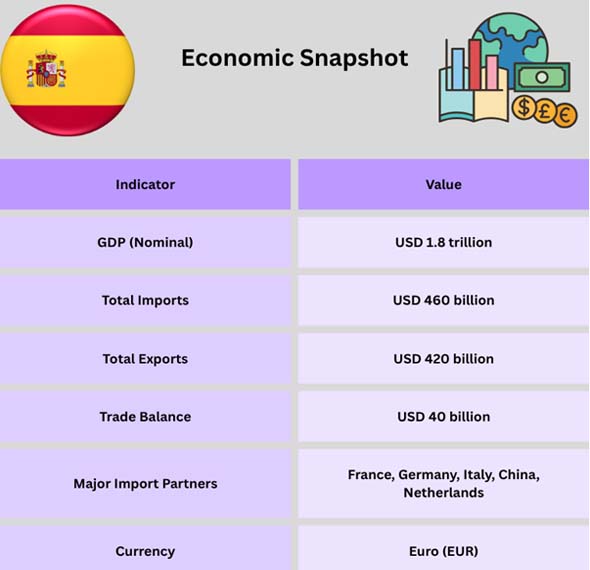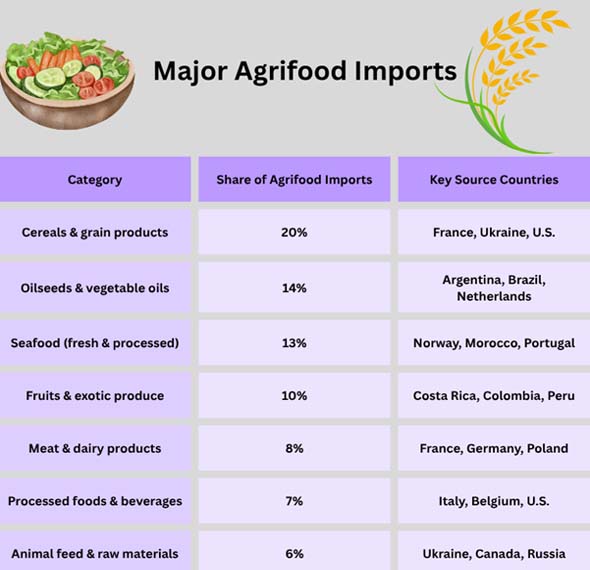
- Nov 11, 2025
Spain's Strong Import Market in Agrifood and Tourism: How Exporters Can Make the Most of It
As per Spain Import Export Trade Data by Import Globals, Spain's need for food, drinks, and things related to tourism is slowly going up. The country has a flourishing tourism economy that pulls in more than 80 million visitors each year and an advanced agrifood supply chain that feeds one of Europe's largest consumer markets.
The country's economy is based on a mix of traditional farming and contemporary retail, hospitality, and logistics infrastructure. As per Spain Import Custom Data by Import Globals, this makes it a key trade center for suppliers from all over the world, including Europe. This blog talks about how Spain's import needs are changing, what is driving growth in the agrifood and tourism industries, and what exporters may do to get into or grow in this market that is changing quickly.
A Look at Spain's Trade and Economy

The economy of Spain is the fourth largest in the EU. It has a lot of manufacturing, a lot of service exports, and a lot of demand at home. After the outbreak, its GDP growth has maintained constant. As per Spain Import Trade Analysis by Import Globals, two of the most important sectors that have helped it stay strong are agriculture and tourism.
Spain is a large producer of agricultural goods, but it still has to import more food to meet the demands of visitors, the food processing industry, and rising consumer expectations.
About 10% of Spain's GDP comes from farming, food production, and distribution as per Import Globals. The agrifood sector is this. The country acquires a lot of its raw materials and semi-finished commodities from other countries, refines them at home, and then sells things like olive oil, wines, and packaged meals that are worth a lot of money. As per Spain import data by Import Globals, The country acquires a lot of its raw materials and semi-finished commodities from other countries, refines them at home, and then sells things like olive oil, wines, and packaged meals that are worth a lot of money.
The demand for plant-based alternatives, vegan products, and organic meals has also expanded as more people become health-conscious and middle class. As per Spain Exporter Data by Import Globals, imports in these categories have grown by more than 10% in the last year.
How Tourism Changes how much People want to buy from other Countries
As per Spain Importer Data by Import Globals, Spain has one of the most active tourism sectors in the world. In 2024, the country got almost 83 million international tourists, which brought in record sums of money for hotels, restaurants, and entertainment industries. The growing tourism industry has a direct impact on how products are brought into the country, especially food, drinks, and hotel and restaurant supplies.
The Most Important Imports for Tourists
Hotels and restaurants get high-quality wines, cheeses, meats, and spirits from other countries to serve to guests from all over the world.
Hospitality Equipment: More hotels are being rebuilt and new resorts are opening, which means that more furnishings, kitchen appliances, and smart appliances are being brought in.
Health and Wellness Products: As per Spain Import Trade Statistics by Import Globals, Spas and resorts bring in organic food, cosmetics, and supplements to meet the needs of eco-tourists.
Imports of building materials that save energy, as well as lighting systems and interior design elements, are growing significantly. Spain is a huge tourist destination, therefore it needs more than just food; it also needs things that make life easier, more fun, and more comfortable.
Plan for Logistics and Distribution
Goods may easily enter into Spain from all around the world because to its logistics system. Spain is a hub for trade between Europe and other parts of the world since it is adjacent to North Africa and has big seaports like Valencia, Barcelona, Algeciras, and Bilbao.
Main Benefits for Importers:
Ports with Good Infrastructure: Can handle a lot of food and containers. Modern cold-chain logistics: Makes sure that items that come into the country that can go bad are in good shape. Joining the EU Single Market means you can trade with other member states without having to pay tariffs.
Advanced Retail Distribution: Food is brought in and distributed by big supermarkets like Mercadona, Carrefour, and El Corte Inglés.
As per Spain Import Shipment Data by Import Globals, Spain is one of the greatest areas in Europe for exporters of food and hospitality goods to do business since it has adequate transportation and is part of the EU.
Trends in importing food from other Countries

To stay up with global trends in health, sustainability, and new ideas, Spain is revamping the way it imports food.
Here are some Important Changes:
If you want supply chains that are fair-trade and low-carbon, you want sustainable sourcing. More and more organic and plant-based foods are coming into the country from Latin America and Northern Europe. Seafood processing and packaging imports: There is an increasing need for better refrigeration and packaging that is good for the environment.
Functional foods and dietary supplements: As per Spain Import Export Trade Analysis by Import Globals, more and more individuals want to know about things that are helpful for their health. These reforms make it easier for exporters to offer things that are good for the environment, easy to trace, and high in nutrients that European customers demand.
Exporters Can Find Business Deals
Spain is an excellent site for exporters in the agrifood and tourism industries because it has a large consumer market, a strong tourism industry, and a well-functioning logistics network.
1. Agrifood Exporters: They work together to deliver cereals, fruits, fish, and specialty foods to market. You can sell organic and health-related goods to people in other countries. Making private-label and co-branded products with Spanish merchants and food processors.
2. Tourism and Hospitality Suppliers: As per Spain Export Data by Import Globals, they provide hotels and restaurants pricey things, drinks, and gourmet food. Giving resorts innovative hospitality tools, energy-saving technologies, and design materials. Partnerships in wellness tourism to bring in spa tools and natural beauty items.
3. Technology and the Environment Vendors: As per Spain Import Data by Import Globals, they sell machines for processing food, computerized inventory systems, and eco-friendly energy solutions for eco-resorts. Exporters that want to sell to Spain benefit from a steady demand, clear rules, and strong buying power in both B2B and retail markets.
Issues in the Import Scene
Spain has a lot of trade potential, however exporters have to deal with a variety of problems:
In the EU, there is competition: As per Spain Export Import Global Trade Data by Import Globals, when it comes to buying food from other countries, prices are very important.
You must observe EU health and labeling laws for Food Safety
High seasonal Variation: The busy tourist season (April to September) makes demand for imports move up and down. Requirements for Sustainability: Being able to keep an eye on things and show their carbon impact is becoming more and more important.
For exporters to be successful, they need to know the requirements for EU compliance, when shipments will arrive, and how to divide up the market.
What to look forward to in the years 2025–2035
Because the population is expanding, more visitors are coming from other countries, and consumers are getting more knowledgeable, Spain's import businesses that deal with agriculture, food, and tourism are likely to keep growing. In the long run, Spain will rely more on imports that make its food more varied and its tourists more appealing.
Last Thoughts
Spain is one of the biggest importers of food, agriculture, and tourism goods in Europe. This shows that its economy is active and based on what people buy. Changes in tourism and people's eating habits are changing how they acquire things, from bulk items to high-quality, long-lasting, and expensive items.
Spain is an excellent site for global exporters to do business since it connects them to both the European market and the most competitive hospitality industry in the world. Spain has one of the most active economies in Europe. Businesses who share its values of quality, innovation, and sustainability will find strong, long-term trade partners there. Import Globals is a leading data provider of Spain Import Export Trade Data.
FAQs
Que. What are the main food and farm goods that Spain buys from other countries?
Ans. Grains, oilseeds, seafood, fruits, and processed meals are the main things that come into the country.
Que. How does tourism affect Spain's need for imports?
Ans. It brings in more gourmet meals, drinks, hospitality equipment, and luxury products.
Que. From which countries does Spain buy the most?
Ans. France, Germany, Italy, China, and the Netherlands are the best providers.
Que. What are the best ways for exporters to make money?
Ans. Food that is organic, seafood, technology for hotels and restaurants, and eco-friendly supplies for hotels and resorts.
Que. Where can you obtain detailed Spain Import Export Global Data?
Ans. Visit www.importglobals.com or email info@importglobals.com for more information on up-to-date data.
